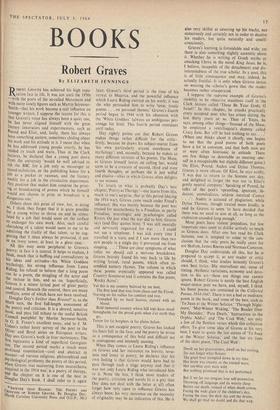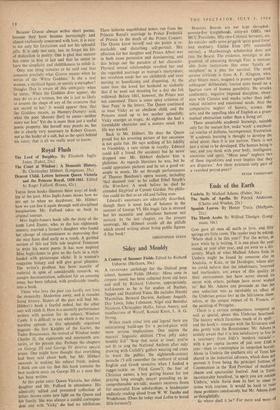BOOKS
Robert Graves
By ELIZABETH JENNINGS
ROBERT GRAVES has achieved his high repu- tation late in life. It was not until the 1950s —with the poets of the so-called Movement and With more lonely figures such as Martin Seymour- Smith—that his work became a real influence on Younger writers. I suppose the reason for this is that Graves's voice has always been a quiet one, he has never aligned himself with the great literary innovators and experimenters, such as Pound and Eliot, and, lastly, there has always been something austere, sometimes chiding about his work and his attitude to it. 1 mean that when bc has addressed young people overtly, he has tended to teach and warn. Thus in the Clark lectures, he declared that a young poet down from the university 'would be well advised to ask the BBC for a job only as messenger or sound-technician, or the publishing house for a Job as a packer or vanman, and the literary Weekly for a job in the circulation department. Any position that makes him condone the print- ing or broadcasting of poems which he himself would not choose to 'print or broadcast is a dangerous one.'
Others share this point of view, but, in doing ao, I think they forget that it is quite possible for a young writer to thrive on and be stimu- lated by a job that would seem on the surface to endanger his own work. Also, such careful cherishing of a talent would seem to me to be admitting the frailty of that talent, to be sug- gesting that it must always be protected, if not in an ivory tower, at least in a glass case.
All this may seem peripheral to Graves's Poetry; in fact it is central. It helps to explain, I think, much that is baffling and contradictory in his ideas and attitudes—his White Goddess mythology, his strong influence from Laura Riding, his refusal to believe that a long poem Can be a poem, the mingling of the actor and the recluse in him, and so on. Superficially, Graves is a minor lyrical poet of great purity and control. Beneath the control, there are many conflicts, some of which have not been resolved.
Douglas Day's Swifter than Reason* is, as the blurb says, the first full-length assessment of the poetry and criticism. It is a shrewd, sensitive book, and pays full tribute to the useful British Council pamphlet by Martin Seymour-Smith, to G. S. Fraser's excellent essay, and to J. M. Cohen's rather hasty survey of the poet in the Oliver and Boyd series on European writers. 13aIr sees Graves's Work in four moVements. The first represents a kind of superficial Georgian tam. The second period marks a much more profound examination—cool and abstract in inanner--of various religious, philosophical and Psychological problems; the poetry of this period, When Graves was recovering from neurasthenia acquired in the 1914 war, is a poetry of therapy, 11,:id the chapter on it is one of the best in tionglas Day's book. I shall refer to it again „* SWIFTER THAN REASON: TF1E POETRY AND ,-RITIC1SM OF ROBERT GRAVES. By Douglas Day. (North Carolina University Press and O.U.P., 30s.) later. Gra■es's third period is the time of his retreat to Majorca, and the powerful influence which Laura Riding exerted on his work; it was she who persuaded him to write 'terse, ironic poems .. . on personal themes.' Graves's fourth period began in 1944 with his obsession with the 'White Goddess' (always an ambiguous per- sonage for him). This fourth period continues until today.
Day rightly points out that Robert Graves makes things rather difficult for the critic: firstly, because he draws his subject-matter from 'his own particularly arcane storehouse of mythology'; and, secondly, because he makes so many different versions of his poems. The Muse, as Graves himself insists on calling her, would seem to be a creature of second, third and even fourth thoughts, or perhaps she is just wilful and elusive—rOles in which Graves often delights to see women.
To return to what is probably Day's best chapter, 'Poetry as Therapy'—one learns from this, much to one's surprise, that at this period (during the 1914 war), Graves came much under Freud's influence; this was mainly because the poet was treated for neurasthenia by a Freudian, or partly Freudian, neurologist and pyschologist called Rivers. On just what the war did to him, Graves says (and Day quotes him), 'I was still mentally and nervously organised for war . . . I could not use a telephone, I was sick every time travelled in a train, and if I saw more than two new people in a single day it prevented me from sleeping. . . These are clear symptoms of what today we should call a nervous breakdown. Graves bravely found his way back to life by writing • lyrical, rural poems, which often re- sembled nursery rhymes. The volume in which these poems eventually appeared was called Country Sentiment and it contains the fine poem, 'Rocky Acres':
Yet this is my country beloved by me best, The first land that rose from chaos and the Flood, Nursing no fat vallies for comfort and rest, Trampled by no hard hooves, stained with no blood.
Bold immortal country whose hill tops have stood Strongholds for the proud gods when o'er earth they go, Terror for fat burghers in far plains below.
This is not escapist poetry; Graves has looked his fears full in the face, and the poetry he wrote as a consequence of this bold and difficult act is courageous and intensely moving.
When Day comes to Laura Riding's influence on Graves and her insistence on brevity, terse- ness and irony in poetry, he declares that his own feeling is that Graves would have had to pass through such a stage anyway and that it was not only Laura Riding who introduced him to it. None the less, I think most readers of the poetry, criticism and novels (it is a pity that Day does not deal with the latter at all) often forget how very open to influence Graves has always been; his very insistence on the necessity of originality may be an indication of this. He is
also very skilful at covering Op his tracks, not consciously and certainly not in order to deceive his readers, but quite naturally and unself- consciously.
Graves's learning is formidable and wide; yet there is also something slightly eccentric about it. Whether he is writing of Greek myths or attacking Christ in the novel King Jesus, he is, I believe, incapable of the detachment and dis- interestedness of the true scholar. In a poet, this is of little consequence and may, indeed, be actually fruitful. It is only when Graves insists on wearing the scholar's gown that the reader becomes rather exasperated.
suppose the supreme example of Graves's inability to be objective manifests itself in the Clark lecture called 'These Be Your Gods, 0 Israel!' In this chapter, he attacks practically every accepted poet who has arisen during the last thirty years or so. Thus of Yeats, he says, among other things—lnstead of the Muse, he employed a ventriloquist's dummy called Crazy Jane. But still he had nothing to say. . (When one thinks about it clearly, one begins to see that the good poems of both poets have a lot in common, and that both men are or were often histrionic in attitude. There are few things so detestable as meeting one- self in a recognisable but slightly different guise.) On Eliot, Pound, Auden and Dylan Thomas, . Graves is more obtuse. Of Eliot, he says acidly, 'I was due to return to the Somme any day, and delighted to ,forget the war too in Eliot's gently neutral company.' Speaking of Pound, he talks of the poet's 'sprawling, ignorant, in- decent, unmelodious, seldom metrical Cantos . . .': Auden is accused of plagiarism, while Dylan Thomas, though treated more kindly, is said by Graves to seem `to have decided that there was no need to aim at all, so long as the explosion sounded long enough.'
Most poets have violent prejudices, but few important ones seem to dislike actively so much as Graves does. After one has read his Clark lectures, one is tempted to come to the con- clusion that the only poets he really cares for are Skelton, James Reeves and Norman Cameron.
Douglas Day understands all this, but he is prepared to accept it, as any reader or critic should, I think, who studies honestly Graves's own best lyrics. His marvellous ear, sense of timing, rhythmic variations, economy and devo- tion to his art—these are things one cannot ignore. Robert Graves is surely the best English major-minor poet we have, and, myself, I think his finest poems are contained in the Collected Poems, 1914-1947. There is not a bad or mediocre poem in the book, and some of the best, such as 'To Juan at the Winter Solstice,' Through Night- mare,' Mid-Winter Waking,' The Reader Over My Shoulder,' Pure Death,' Instructions to the Orphic Addict' and 'The Cool Web,' are only a few of the flawless verses which this collection offers. To give some idea of Graves at his very best, 1 want to quote the last stanza of 'To Juan at the Winter Solstice,' and the last six lines of the short poem, The Cool Web':
Dwell on her graciousness, dwell on her smiling, Do not forget what flowers The great boat trampled down in ivy time.
Her brow was creamy as the crested wave, Her sea-blue eyes were wild But nothing promised that is not performed.
But if we let our tongues lose self-possession, Throwing oft language and its watery clasp Before our death, instead of when death comes, Facing the wide glare of the children's day, Facing the rose, the dark sky and the drums. We shall go mad no doubt and die that way.
Because Graves always writes short poems, because they have become increasingly and almost exclusively concerned with love, it is easy to see only his limitations and not his splendid gifts. It is only too easy, too, to forget his life of dedication to poetry. One is glad that success has come to him at last and that he seems to have the simplicity and childlikeness to relish it.
Only one thing remains to be said and that concerns precisely what Graves means when he writes of the 'White Goddess.' Is she a real woman, a mythical figure, or merely a metaphor? Douglas Day is aware of this ambiguity when he states, When the Goddess does appear, she may do so as a woman, but she is just as likely to assume the shape of any of the creatures that are sacred to her.' It would appear then, that the Goddess means, as Humpty-Dumpty said, what the poet 'chooses (her] to mean—neither more nor less.' Yet she is more than just a useful poetic property. She herself may puzzle us, but she is clearly very necessary to Robert Graves, not as the leader of a cult, but as the spirit behind his verse; that is all we really need to know.































 Previous page
Previous page